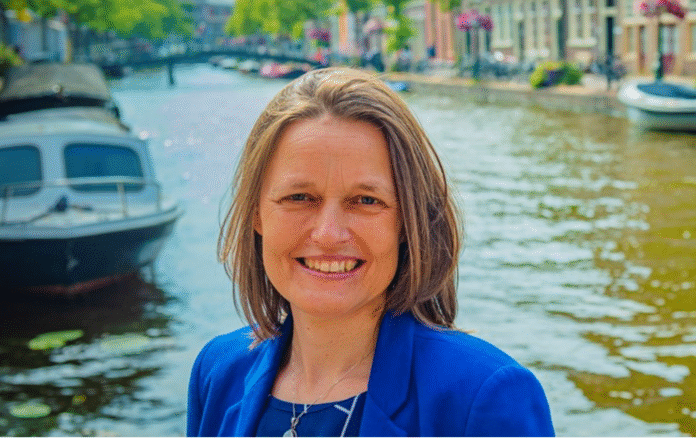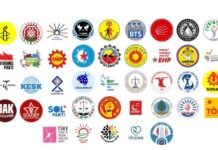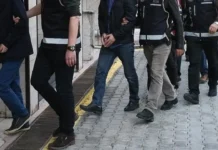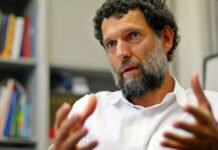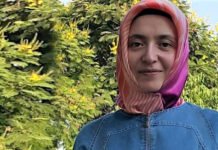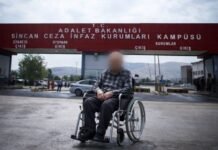Defence For Children Netherlands Director Mirjam Elisabeth Blaak said in an interview with the Stockholm Center for Freedom that although there is an assumption that children’s rights is a universally accepted, normative cause, in certain contexts it has become dangerous work.
“Children are not politically active themselves, but they are perceived as part of a political group simply because of their parentage. As a result, they often face stigma, discrimination and even violence within their schools or communities,” Blaak said. “Authoritarianism creates an unsafe environment that directly impacts children’s psychological and emotional development.”
As part of SCF’s “Freedom Talks,” our research director Dr. Merve R. Kayikci spoke with Blaak about children’s rights and the impact of rising authoritarianism on the well-being of children.
Defence for Children Netherlands advocates for the rights of all children, both in the Netherlands and beyond. Through their Children’s Rights Helpdesk, they provide free legal support to children whose rights are at risk of being violated. They conduct research and offer education to professionals, parents and children and advocate for the protection and enforcement of children’s rights in legislation and policy.
Blaak began her journey with the organization in June 2003 as an education staff member and became a passionate advocate for children’s rights and a tireless defender of children suffering from injustice. Over the years, she has played a vital role in the development and professionalization of Defence for Children Netherlands. Since her appointment as executive director on July 1, 2019, she has taken major steps to future-proof the organization. Her work includes publications focused on the protection of children’s rights.
In your experience, how does authoritarian governance specifically affect children’s access to education, healthcare and basic rights?
When you examine authoritarian governments, you’ll notice a consistent reluctance to address civil and political rights — especially in relation to children. These governments often emphasize their commitment to children’s rights, and many have ratified the UN Convention on the Rights of the Child. However, in practice, they tend to focus only on non-political areas such as access to education and parental support.
Take China, for example — a clearly authoritarian government. While officials may claim they value children’s rights, they primarily highlight education access or services for children lacking parental care. What they avoid entirely are the civil and political rights guaranteed by the convention — things like freedom of expression, participation and belief. In these contexts if you want to work on children’s rights, you’re forced to navigate strictly non-political issues. It makes advocacy incredibly difficult because you’re essentially prohibited from addressing core components of the convention.
That’s particularly troubling because the convention is meant to be holistic. Its real strength lies in its emphasis on participation rights and the civil and political freedoms of children. These are not just add-ons: They are central to the vision of children as autonomous rights holders, independent of their parents.
This issue isn’t limited to places like China. In Eastern Europe — Hungary, for instance — we’re seeing a similar trend. Right-wing, increasingly authoritarian governments are rolling back children’s rights. There’s a push to reframe children as extensions of their parents rather than individuals with their own rights. Some governments argue that parents should have the final say on matters like religion or education, even when it conflicts with the child’s rights as outlined in the convention.
What becomes clear is that the understanding of children’s rights is deeply contextual. In democratic societies, children’s rights are framed within a broader human rights perspective. But in more authoritarian settings, the concept is often stripped of its political and civil dimensions. That’s why it’s crucial to view the convention not just as a set of technical standards but as part of the larger universal human rights framework.
Can you describe some of the most alarming consequences of authoritarian policies on children’s emotional and psychological development?
I think it ultimately comes down to the conditions required for healthy child development. Children can and do develop in authoritarian or conflict-affected situations, but these environments are often unsafe. And without safety — political, social, or physical — children lack the foundational conditions necessary for healthy development.
This is where the UN Convention on the Rights of the Child offers an ideal framework. It outlines the standards for what children need — not just in terms of survival and basic services but also in terms of rights like freedom of speech, freedom of assembly and the broader sense of security that comes with those freedoms.
In many parts of the world, even when a government is not explicitly authoritarian, the situation can be so fragile that basic political security is absent. In such unstable contexts, the entire society suffers a sense of insecurity, and children are particularly affected by that.
Then, when you zoom in on individual cases — such as children whose parents have been imprisoned for political reasons — you see how these vulnerabilities multiply. These children are not politically active themselves, but they are perceived as part of a political group simply because of their parentage. As a result, they often face stigma, discrimination and even violence within their schools or communities.
This kind of environment creates a profound sense of unsafety, which directly impacts their psychological and emotional development. On top of that, they lose contact with their parents — often their primary caregivers. The absence of parental care, love and guidance is deeply detrimental to both the children and the parents. It’s a loss of both emotional connection and practical support.
In these situations you can clearly see the absence of civil and political rights. There’s no freedom of thought or expression for the child — they’re categorized by association, without having made any choice themselves. Their parents made political decisions, but the children bear the consequences. And that, understandably, makes healthy development incredibly difficult.
In Turkey, we’ve witnessed a significant rise in criminal activities among young people and children often working in informal jobs, leading to workplace accidents and even fatalities, as well as an increase in child marriages. Many human rights advocates and opposition politicians attribute these issues to government policies, worsening poverty and mismanagement. Based on your experience, have you observed similar phenomena in other authoritarian regimes, and do you see a correlation between such governance and these social issues?
I’m not entirely sure about the specifics on this issue, but it’s certainly worth further investigation. From my own observations, I’ve noticed a growing concern around children’s involvement in criminal activities. However, it’s not necessarily a direct rise in criminal behavior among children, but rather a deeper issue of vulnerability.
In many cases, there seems to be a lack of governmental oversight or intervention, which may contribute to this vulnerability. That said, this is an area that requires expert research, and I cannot give a definitive answer. What I can say is that when children are stigmatized — particularly those whose parents may be incarcerated or targeted due to political reasons — they are at a heightened risk of falling into harmful behaviors. These children are more vulnerable to being recruited or groomed by criminal groups, and they are at greater risk of becoming victims of sexual abuse, exploitation or even labor trafficking.
This is a phenomenon we see globally. Criminal groups specifically target children in vulnerable positions, often seeking those who lack protection, and it’s a growing concern in many countries. It’s tied to the broader issue of insecurity. As I mentioned earlier, insecurity leaves children exposed, vulnerable to all forms of exploitation.
I also think this speaks to a broader emotional state: When children feel they are not protected by their government, it amplifies the sense of insecurity. That’s a very difficult situation for a child to endure. In authoritarian regimes, or even in less stable environments, children who belong to marginalized or suppressed groups often find themselves with no safety net, no protection. At best, they may have some family support, but even that is often limited.
Ultimately, these children feel abandoned. When there’s no governmental protection, no family support and a general sense of being disregarded, they can feel completely alone. This sense of isolation and lack of safety can lead to serious developmental and psychological consequences.
With large-scale migration and a high number of refugees, migrant children are among the most vulnerable populations. How does authoritarian governance specifically impact their well-being, particularly in terms of access to education, healthcare and protection from exploitation or abuse? Are there unique challenges they face in these environments compared to those in more democratic contexts?
Of course, these children are very vulnerable, also girls and children with disabilities but when discussing vulnerable groups, we must not overlook specific groups that require attention, such as boys. In many contexts, there’s a tendency to focus on the vulnerabilities of girls, but boys can face unique challenges that often go unnoticed. These challenges, particularly in conflict zones or authoritarian regimes, can create additional risks for boys.
For example, in some authoritarian settings, certain groups are labeled as terrorist organizations by the government. These groups may be involved in violent activities or political opposition. In this context, children — especially boys — are vulnerable to being recruited by radicalized groups, which can lead to engagement in criminal or violent behaviors.
This is a growing concern. Over the past decade, we’ve observed a shift where boys, who might previously have been excluded from gang activities, are now being recruited into these groups. This includes involvement in violent behaviors, such as gang-related crimes or aggression against peers. In some cases, we’ve seen young boys using violence against others they perceive as more privileged or simply out of frustration with their circumstances.
This trend isn’t limited to any one region. For instance, in the Netherlands we’ve seen an increase in youth violence, including stabbings and shootings among young people. These behaviors are fueled by various factors — social and economic inequality, peer pressure and a lack of opportunity — but a contributing factor may be the rise of digital environments where young people are exposed to violent content.
Another critical factor to consider is the growing political insecurity around the world. As political rhetoric becomes increasingly polarizing and violent, we’re seeing that aggression seep into society, especially among youths. The more extreme the political language, the more it feeds into societal violence and in turn can make vulnerable children more susceptible to violent ideologies.
This is where further research into gang recruitment, youth radicalization and the influence of digital media becomes crucial. We need to better understand how these factors interact and what can be done to protect young people from becoming part of these harmful cycles.
How does Defence for Children work to protect children in countries with authoritarian governments? What kind of programs or advocacy have you found to be most effective?
We operate as a network of local organizations, many of them founded and led by local legal experts. Currently, we work across 25 countries, each with its own unique political landscape. These differing contexts significantly influence what our member organizations can do and how effective they can be.
In many places it is still possible to provide individual legal assistance to children, regardless of the broader political situation. That’s often the most consistent form of impact. However, when it comes to broader goals — such as influencing legislation or changing policy — progress largely depends on the political will of the government. If authorities are not open to dialogue, then advocacy becomes incredibly difficult.
In some countries, political will is not just absent, it’s actively hostile. We’ve seen that child rights advocates now face increasing threats. What used to be a relatively neutral area — speaking out for children’s rights — has, over the past 15 years, become deeply politicized. Advocates are no longer just discussing protections for children; they’re increasingly viewed as political actors challenging state power.
In fact, some of our colleagues have had to flee their countries simply for speaking out about children’s rights. That shift is alarming. You would think children’s rights would be a universally accepted, normative cause, but in certain contexts it has become dangerous work. This reflects a broader cultural and political shift, where even the most seemingly non-controversial issues are now framed through a highly politicized lens.
What strategies can communities and global organizations employ to empower children in authoritarian regimes and give them a sense of agency and hope?
One of the most difficult situations we’re witnessing right now is that of our member organization, Defense for Children Palestine. They operate primarily in the West Bank, and although they have some contacts in Gaza, it’s currently almost impossible to carry out their work there due to the ongoing conflict.
Historically, they provided legal support to children held in military detention, representing them in military courts and advocating for their rights. However, they no longer have access to these children, and their ability to provide direct legal assistance has been severely restricted.
Despite these challenges, the organization remains committed to its mission. While they acknowledge the immense difficulty of the situation — and the despair many children are facing — they’ve shifted their focus toward empowering children through education. They’re bringing children together to talk about their rights, to teach them what those rights mean and to help them understand how they can one day advocate for themselves.
It’s a strategy rooted in resilience and hope. The Palestinian government itself is not in a strong position to offer much support, and this limits the broader impact of advocacy. Yet the act of teaching children that they are rights holders — that they have agency and dignity — is in itself a powerful form of resistance.
In other countries where the political climate is less volatile, we’ve used similar strategies, often with more visible success. There, children are sometimes able to see the concrete effects of their advocacy. But in contexts like the West Bank, even helping a child realize that they matter, that they are not defined by oppression or normalized violence — that alone can be transformative.
It’s about saying: You are a child. You are a human being. You have rights. You are important. And even now, there is still a way for you to learn, to grow and to advocate for your future.
Looking ahead, what changes do you hope to see in global policy or attitudes toward children’s rights in authoritarian contexts over the next decade?
In such a politically fragile era, marked by war, polarization and institutional instability, we’re reminded just how urgent it is to strengthen education on children’s rights. Especially now, we need to invest in the future by nurturing a generation of political leaders who understand, value and protect human rights, particularly the rights of children. That’s why one of our key strategies is to emphasize this kind of rights education for children themselves. It’s long-term work but potentially transformative.
What I would really like to see is a broader, global shift in how we view children. Too often, they are not seen as independent human beings but rather as extensions of their families, without their own agency. That needs to change. Children must be recognized as rights holders in their own right. Once that shift happens, governments can begin designing policies with a clear lens on children’s specific needs and experiences — not as an afterthought but as a core focus.
The Convention on the Rights of the Child is very clear about this. And although cultural perspectives may differ — with some societies viewing children more collectively, as part of a family or community — the fundamental principle remains: Within those structures a child still has the right to be seen, to be heard and to be treated as a person in their own capacity. This isn’t about promoting individualism; it’s about recognition, protection and respect.
Right now, children are far too often invisible in policy. They’re collateral damage — in war, in poverty, in social systems. When policies are made, children are treated as one “vulnerable group” among many, like a checkbox. But we argue that children should not just be seen as a vulnerable subgroup. They should be viewed as a central concern. because every policy impacts children, whether directly or indirectly.
For example, when designing refugee policies, children shouldn’t be an afterthought or a special category you consider after dealing with the adult population. Children should be a starting point. The same is true in areas like domestic violence, poverty, education, mental health or social welfare. Every one of these issues has a distinct and lasting impact on children.
So yes, I hope for a future where children are treated not only as a group to be protected but as a group that is prioritized. Where the first question in policymaking is how does this affect children, not the last. Because if we build policies with children in mind, from social benefits to psychiatric care, we won’t just be supporting their rights; we’ll be building stronger, more humane systems for everyone.

